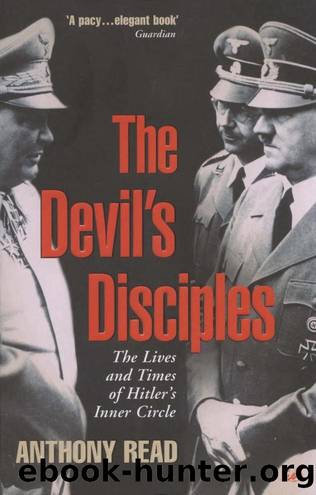The Devil's Disciples by Anthony Read

Author:Anthony Read [Read, Anthony]
Language: eng
Format: epub
Tags: Biography & Autobiography, Historical, History, Europe, General, Military, World War II, Political Science, Political Ideologies, Fascism & Totalitarianism, Political, Germany
ISBN: 9781448114252
Google: Cu0U2mfAGbUC
Publisher: Random House
Published: 2011-12-30T19:00:00+00:00
XXI
KRISTALLNACHT
ALTHOUGH HIS STANDING in Hitlerâs eyes had been seriously damaged by his backing for the Munich agreement, Göring still persevered with his efforts to gain the rest of Czechoslovakia without a war. He was soon rewarded by promising signs. On 3 October, French Ambassador François-Poncet hurried back from consulting Daladier and Bonnet in Paris to tell him that the FrancoâCzech alliance was finished and that France was eager to make a deal with Germany. 1 The new Czech President, Emil Hácha, who had replaced BeneÅ¡ after Munich, could hardly wait to abase himself and his country by sending his Minister in Berlin, Vojtech Mastný to grovel to Göring, who noted in his diary for 11 October that Mastný offered:
most emphatic assurance that the new Czechia will realign her foreign policies: closest friendship with Germany. Assurance that internally the coming regime will lean to the extreme right. Liquidation of Communism. Fate and life of Czechia are in Germanyâs hands. He pleads that the country not be reduced to penury . . .
All this suited Göringâs purposes perfectly. Having fatally weakened Czechoslovakia by carving off the Sudetenland, he aimed to complete the process by encouraging Slovakia and the other parts of the federation to break away, at which point Germany would simply pick up the pieces. The Czech heartland of Bohemia and Moravia, with its rich mineral deposits and industrial resources, could either be annexed or become a totally dependent German satellite. âA Czech state minus Slovakia is even more completely at our mercy,â he noted to the Foreign Ministry, revealing his long-term aims by adding: âAir base in Slovakia for operating against the East very important.â Pursuing this line, he had secret talks with Slovak leaders, who had already achieved autonomy immediately after Munich â the countryâs name had now been officially changed to the hyphenated Czecho-Slovakia â but now told him they wanted âcomplete independence, with very close political, economic and military ties with Germanyâ. He interpreted this as a willingness to become a client state, and encouraged them by telling them that this was their only hope of fending off the predatory Hungarians, who were keen to annex large chunks of their territory.
As autumn turned to winter, Göring continued to hold secret talks with the Slovaks, Czechs, Romanians, Hungarians and, above all, the Poles. He invited Ambassador Lipski out to Carinhall to sound him out about his âgrand solutionâ of creating a German empire in the East, which he hoped to achieve with the help of a compliant Poland, acting as Germanyâs partner and receiving a share of the spoils in return. Like most Germans, he wanted to take back the formerly German land around Poznan, or Posen, which had been ceded in 1919, compensating the Poles with new territory to be taken from the Soviet Union on her eastern frontier, mainly from the Ukraine. War with Poland did not figure in his plans: he was convinced he could achieve all that he wanted through friendly persuasion, based on the personal relationships he had been nurturing for so long with the Polish leaders.
Download
This site does not store any files on its server. We only index and link to content provided by other sites. Please contact the content providers to delete copyright contents if any and email us, we'll remove relevant links or contents immediately.
Harry Potter and the Goblet Of Fire by J.K. Rowling(3045)
Unfinished: A Memoir by Priyanka Chopra Jonas(2918)
Never by Ken Follett(2880)
The Man Who Died Twice by Richard Osman(2299)
Machine Learning at Scale with H2O by Gregory Keys | David Whiting(2291)
Fairy Tale by Stephen King(2069)
Will by Will Smith(2041)
Rationality by Steven Pinker(1765)
The Storyteller by Dave Grohl(1660)
The Dawn of Everything: A New History of Humanity by David Graeber & David Wengrow(1570)
The Dark Hours by Michael Connelly(1570)
The Stranger in the Lifeboat by Mitch Albom(1532)
Cloud Cuckoo Land by Anthony Doerr(1434)
The Becoming by Nora Roberts(1330)
Friends, Lovers, and the Big Terrible Thing by Matthew Perry(1327)
New Morning Mercies: A Daily Gospel Devotional by Paul David Tripp(1323)
Einstein: His Life and Universe by Walter Isaacson(1315)
Crying in H Mart by Michelle Zauner(1315)
A Short History of War by Jeremy Black(1300)
